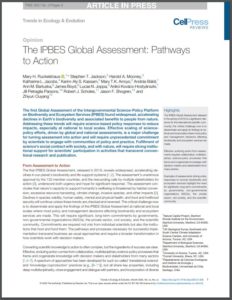Full Title: The IPBES Global Assessment: Pathways to Action
Author(s): Mary H. Ruckelshaus, Stephen T. Jackson, Harold A. Mooney, Katharine L. Jacobs, Karim-Aly S. Kassam, Mary T.K. Arroyo, András Báldi, Ann Bartuska, James Boyd, Lucas N. Joppa, Anikó Kovács-Hostyánszki, Jill Petraglia Parsons, Robert J. Scholes, Jason F. Shogren, and Zhiyun Ouyang
Publisher(s): Trends in Ecology & Evolution
Publication Date: February 18, 2020
Full Text: Download Resource
Description (excerpt):
The IPBES Global Assessment released in the spring of 2019 is a significant milestone for the international scientific community; the critical challenge now is to disseminate and apply its findings at national and local scales where most policy and management decisions affecting biodiversity and ecosystem services are made.
Effective, enduring action from assessments requires collaborative, multidisciplinary science-policy processes that frame and cogenerate knowledge with decision makers and stakeholders from many sectors.
Examples of assessments driving policy responses to recover biodiversity and ecosystem services highlight the need for significant, long-term commitments by governments, non-governmental organizations (NGOs), the private sector, civil society, and the scientific community.
The first Global Assessment of the Intergovernmental Science-Policy Platform on Biodiversity and Ecosystem Services (IPBES) found widespread, accelerating declines in Earth’s biodiversity and associated benefits to people from nature. Addressing these trends will require science-based policy responses to reduce impacts, especially at national to local scales. Effective scaling of science-policy efforts, driven by global and national assessments, is a major challenge for turning assessment into action and will require unprecedented commitment by scientists to engage with communities of policy and practice. Fulfillment of science’s social contract with society, and with nature, will require strong institutional support for scientists’ participation in activities that transcend conventional research and publication.
